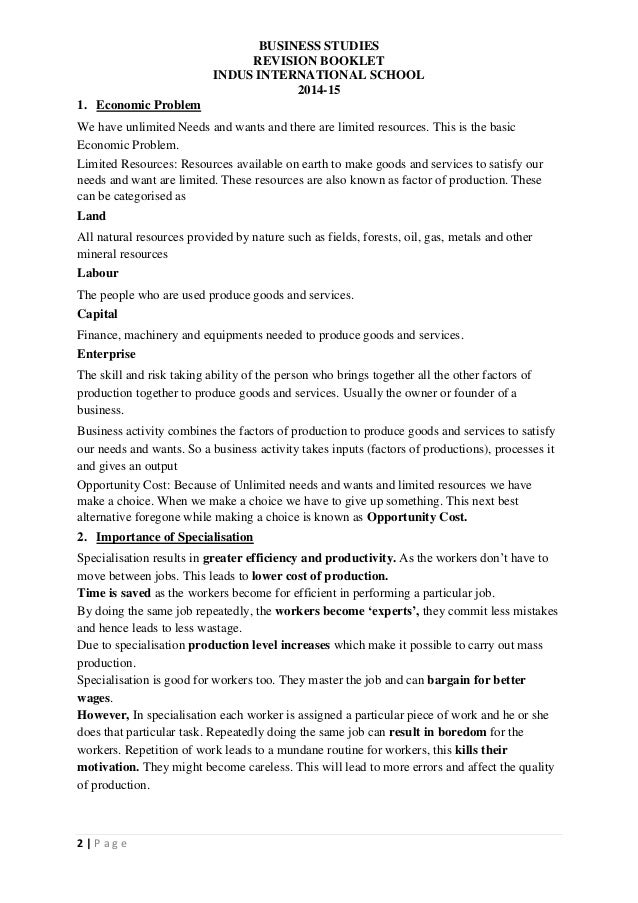Igcse Business Studies Notes
- Igcse Business Studies Notes 2019 Pdf
- Igcse Business Studies Notes Pdf
- Igcse Business Studies Notes Pdf
IGCSE Business Studies 0450. 1 Understanding business activity; 2 People in business; 3 Marketing; 4 Operations management; 5 Financial information and decisions; 6 External influences on business activity; IGCSE Chemistry 0620. 1 The particulate nature of matter; 2 Experimental techniques; 3 Atoms, elements and compounds; 4 Stoichiometry; 5. The Cambridge IGCSE Business Studies syllabus develops learners' understanding of business activity in the public and private sectors, and the importance of innovation and change. Learners find out how the major types of business organisation are established, financed.
Cambridge IGCSE Business Studies Syllabus code 0450. For Cambridge IGCSE Business Studies, candidates take two compulsory components, Paper 1 and Paper 2. Both question papers will draw on topics taken from the whole of the syllabus content. All candidates are eligible for grades A. to G. Paper 1 - 1 hour 30 minutes. Download high school Business Studies Notes for form 1, 2, 3, and 4 in pdf and word. These Notes are suitable for KCSE and IGCSE revision.

We've been busy extending and updating our collection of online study notes designed to support core topics for GCSE & IGCSE Business Studies. We've still got some more to add and we'll update this blog entry with the latest study notes as soon as they are available. Please bookmark this blog entry and share the link with your colleagues and students.

Igcse Business Studies Notes 2019 Pdf
GCSE & IGCSE Business Studies - Online Revision Notes from tutor2u
Igcse Business Studies Notes Pdf

Igcse Business Studies Notes Pdf
| Enterprise and Entrepreneurs | |
| What is enterprise? | Objectives of a business startup |
| Qualities of an entrepreneur | Sources of new business ideas |
| Risks and rewards of enterprise | Creative thinking by entrepreneurs |
| Invention | Innovation |
| Planning a startup | Contents of a startup business plan |
| Franchising for startups | Social enterprise |
| Adding value | Beating the competition as a new business |
| Business Organisation & Objectives | |
| Aims and objectives of business | Starting a business |
| Departments in a business | Financing a new business |
| Growing a business | Sole traders |
| Partnerships | Limited companies |
| Franchises | Co-operatives |
| Span of control | Stakeholders and ethics |
The External Environment | |
| Introduction to the external environment | Economic sectors |
| The Business / Economic cycle | Business and globalisation |
| Government spending | Government taxation |
| Exchange rates | Interest rates - introduction |
| Interest rates & business | Business & the Environment |
| Labour market and unemployment | Business and the law |
| Business and technology | Business ethics - introduction |
| Business ethics in practice | Europe and business |
| Marketing | |
| What is marketing ? | Kinds of market |
| Marketing orientation | Market segmentation - introduction |
| Marketing's role in business | Market segments |
| Market mapping | Understanding customers |
| Marketing strategy - introduction | The marketing mix |
| How products are distributed | Marketing online - E-commerce |
| Distribution channels | Distribution intermediaries |
| Personal selling | |
| Introduction to products | Brands |
| Product life cycle | Product portfolio - the Boston Matrix |
| Product differentiation & USPs | SWOT analysis & marketing |
| Promotion - introduction & overview | |
| Promotion - advertising | Promotion - direct marketing |
| Promotion - sales promotion | Public relations and sponsorship |
| Marketing research - introduction | |
| Marketing research - questionnaires | Marketing research - primary research |
| Quantitative & qualitative market research | |
| Pricing - introduction | Pricing strategies |
| Pricing objectives | |
| Finance | |
| Introduction to finance | Why businesses need finance |
| Startups - finance considerations | Startups - Personal sources of entrepreneurs |
| Startup - cash flow problems | Causes of cash flow problems |
| Handling a cash flow problem | |
| Understanding demand | Understanding business revenues |
| Introduction to cash flow | The cash flow forecast |
| Estimating revenues | |
| What is profit? | How is profit used by a business? |
| How a business handles a loss | |
| Business costs - overview | |
| Breakeven< | Breakeven and contribution |
| Analysing financial performance | |
| Balance sheet | Profit and Loss account |
| Sources of finance | Bank loans and overdrafts |
| Shares as a source of finance | Other external sources of finance |
| Depreciation | Why businesses need credit |
| Managing People in a Business | |
| Communication in a business | Effective communication |
| Communication barriers | Management styles |
| Employee representation | Functions in a business |
| Organisation structures and charts | Span of control |
| Delayering | |
| Centralisation | Decentralisation |
| Motivating employees - introduction | Motivation - financial rewards |
| Methods of pay | Staff retention |
| Motivation - non financial rewards | Motivation - main theories |
| Recruitment - introduction | Recruitment - methods |
| Recruitment - interviews | Recruitment - job applications |
| Recruitment - workforce planning | Appraisal |
| Groups at work - trade unions | Handling industrial disputes |
| Training - introduction | Training - types of training |
| Employment legislation | |
| Production and Operations | |
| Choosing a business location | Stages of production |
| Economies of scale | Diseconomies of scale |
| Production efficiency | Improving business efficiency |
| The production process | Flow production method |
| Job production method | Batch production method |
| Lean production - introduction | Lean production - methods |
| Quality - introduction | Quality management - methods |
| Stock control | |